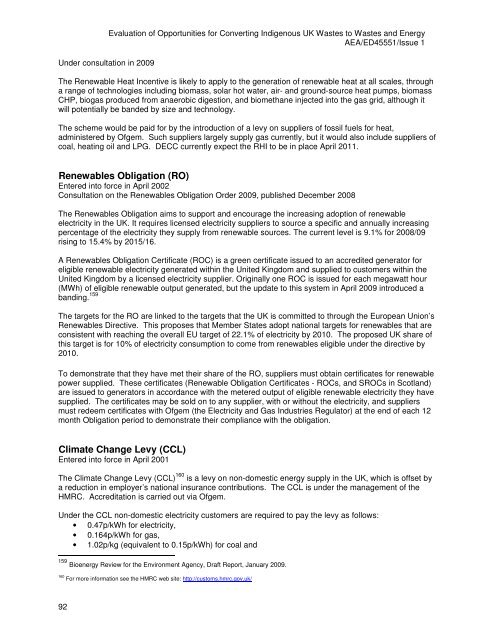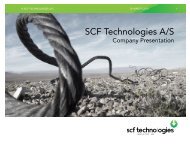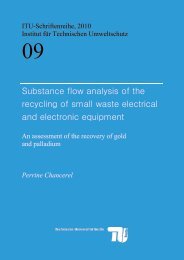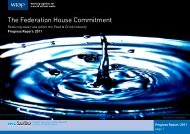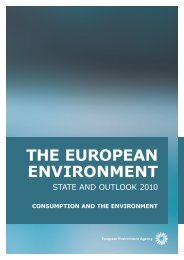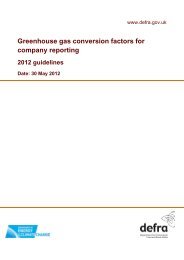to read the full report - Ecolateral by Peter Jones
to read the full report - Ecolateral by Peter Jones
to read the full report - Ecolateral by Peter Jones
You also want an ePaper? Increase the reach of your titles
YUMPU automatically turns print PDFs into web optimized ePapers that Google loves.
Under consultation in 2009<br />
92<br />
Evaluation of Opportunities for Converting Indigenous UK Wastes <strong>to</strong> Wastes and Energy<br />
AEA/ED45551/Issue 1<br />
The Renewable Heat Incentive is likely <strong>to</strong> apply <strong>to</strong> <strong>the</strong> generation of renewable heat at all scales, through<br />
a range of technologies including biomass, solar hot water, air- and ground-source heat pumps, biomass<br />
CHP, biogas produced from anaerobic digestion, and biomethane injected in<strong>to</strong> <strong>the</strong> gas grid, although it<br />
will potentially be banded <strong>by</strong> size and technology.<br />
The scheme would be paid for <strong>by</strong> <strong>the</strong> introduction of a levy on suppliers of fossil fuels for heat,<br />
administered <strong>by</strong> Ofgem. Such suppliers largely supply gas currently, but it would also include suppliers of<br />
coal, heating oil and LPG. DECC currently expect <strong>the</strong> RHI <strong>to</strong> be in place April 2011.<br />
Renewables Obligation (RO)<br />
Entered in<strong>to</strong> force in April 2002<br />
Consultation on <strong>the</strong> Renewables Obligation Order 2009, published December 2008<br />
The Renewables Obligation aims <strong>to</strong> support and encourage <strong>the</strong> increasing adoption of renewable<br />
electricity in <strong>the</strong> UK. It requires licensed electricity suppliers <strong>to</strong> source a specific and annually increasing<br />
percentage of <strong>the</strong> electricity <strong>the</strong>y supply from renewable sources. The current level is 9.1% for 2008/09<br />
rising <strong>to</strong> 15.4% <strong>by</strong> 2015/16.<br />
A Renewables Obligation Certificate (ROC) is a green certificate issued <strong>to</strong> an accredited genera<strong>to</strong>r for<br />
eligible renewable electricity generated within <strong>the</strong> United Kingdom and supplied <strong>to</strong> cus<strong>to</strong>mers within <strong>the</strong><br />
United Kingdom <strong>by</strong> a licensed electricity supplier. Originally one ROC is issued for each megawatt hour<br />
(MWh) of eligible renewable output generated, but <strong>the</strong> update <strong>to</strong> this system in April 2009 introduced a<br />
banding. 159<br />
The targets for <strong>the</strong> RO are linked <strong>to</strong> <strong>the</strong> targets that <strong>the</strong> UK is committed <strong>to</strong> through <strong>the</strong> European Union’s<br />
Renewables Directive. This proposes that Member States adopt national targets for renewables that are<br />
consistent with reaching <strong>the</strong> overall EU target of 22.1% of electricity <strong>by</strong> 2010. The proposed UK share of<br />
this target is for 10% of electricity consumption <strong>to</strong> come from renewables eligible under <strong>the</strong> directive <strong>by</strong><br />
2010.<br />
To demonstrate that <strong>the</strong>y have met <strong>the</strong>ir share of <strong>the</strong> RO, suppliers must obtain certificates for renewable<br />
power supplied. These certificates (Renewable Obligation Certificates - ROCs, and SROCs in Scotland)<br />
are issued <strong>to</strong> genera<strong>to</strong>rs in accordance with <strong>the</strong> metered output of eligible renewable electricity <strong>the</strong>y have<br />
supplied. The certificates may be sold on <strong>to</strong> any supplier, with or without <strong>the</strong> electricity, and suppliers<br />
must redeem certificates with Ofgem (<strong>the</strong> Electricity and Gas Industries Regula<strong>to</strong>r) at <strong>the</strong> end of each 12<br />
month Obligation period <strong>to</strong> demonstrate <strong>the</strong>ir compliance with <strong>the</strong> obligation.<br />
Climate Change Levy (CCL)<br />
Entered in<strong>to</strong> force in April 2001<br />
The Climate Change Levy (CCL) 160 is a levy on non-domestic energy supply in <strong>the</strong> UK, which is offset <strong>by</strong><br />
a reduction in employer’s national insurance contributions. The CCL is under <strong>the</strong> management of <strong>the</strong><br />
HMRC. Accreditation is carried out via Ofgem.<br />
Under <strong>the</strong> CCL non-domestic electricity cus<strong>to</strong>mers are required <strong>to</strong> pay <strong>the</strong> levy as follows:<br />
• 0.47p/kWh for electricity,<br />
• 0.164p/kWh for gas,<br />
• 1.02p/kg (equivalent <strong>to</strong> 0.15p/kWh) for coal and<br />
159 Bioenergy Review for <strong>the</strong> Environment Agency, Draft Report, January 2009.<br />
160 For more information see <strong>the</strong> HMRC web site: http://cus<strong>to</strong>ms.hmrc.gov.uk/


